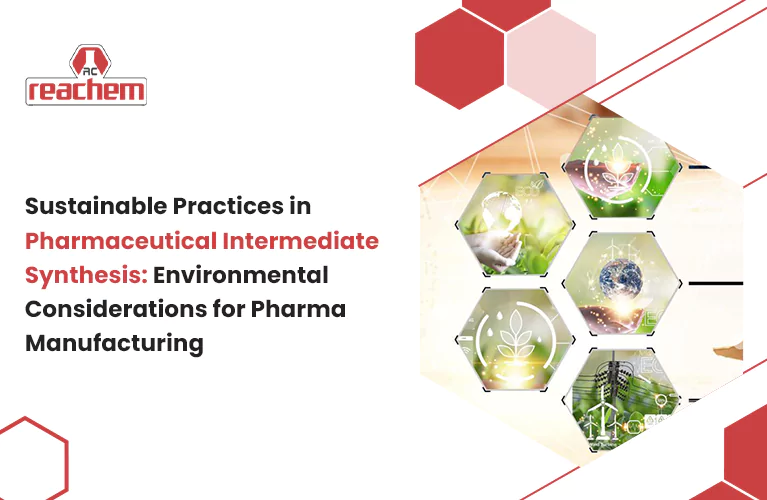
Sustainable Practices in Pharmaceutical Intermediate Synthesis: Environmental Considerations for Pharma Manufacturing
The pharmaceutical sector plays an undeniably vital role in providing essential medications worldwide. However, beneath the surface exists a stark reality of environmental degradation and unsustainable practices. This blog will explore the significance of adopting sustainable approaches in synthesising pharmaceutical intermediates. We will also talk about how these practices contribute to reducing environmental impact. As the pharmaceutical industry continues to grow, prioritising sustainability is essential to minimise the ecological footprint of manufacturing processes. Now, we will navigate through the realm of sustainable pharmaceutical synthesis. We will also understand how environmentally conscious practices are shaping the future of pharma manufacturing.
What are Pharmaceutical Intermediates?
Pharmaceutical intermediates are chemicals created while making active pharmaceutical ingredients (APIs). They serve as intermediate stages in the manufacturing process and undergo various chemical reactions to form the final drug product.
Key Points:
- Intermediates are essential building blocks in pharmaceutical manufacturing, facilitating the synthesis of complex drug molecules.
- They undergo purification and isolation steps to ensure high purity and quality standards in the final pharmaceutical product.
- Pharmaceutical intermediates are sorted by their chemical structure, functional groups, and their therapy purpose.
Pharmaceutical intermediates are crucial for crafting safe and effective medicines, guaranteeing high standards of quality and effectiveness.
Importance of Sustainable Practices in Pharmaceutical Intermediate Synthesis
Sustainable practices in pharmaceutical intermediate synthesis are crucial for minimising environmental impact and promoting long-term ecological balance.
Key Points:
- Adopting green chemistry principles reduces the use of hazardous chemicals and solvents, minimises waste generation, and reduces pollution.
- Energy-efficient synthesis routes lower carbon emissions and energy consumption, contributing to environmental sustainability.
- Implementing eco-friendly manufacturing processes enhances the eco-profile of pharmaceutical products, aligning with consumer demands for sustainable goods.
- Sustainable practices also foster corporate social responsibility and stakeholder engagement, enhancing brand reputation and market competitiveness.
- Long-term environmental stewardship ensures the preservation of natural resources and ecosystems for future generations.
Embracing sustainable practices in pharmaceutical intermediate synthesis is imperative. It safeguards the environment and promotes a healthier planet.
Green Chemistry Principles in Intermediate Synthesis
Green chemistry principles advocate for the design of chemical processes that minimise environmental impact and maximise efficiency.
Key Points:
- Using renewable feedstocks and bio-based starting materials reduces reliance on fossil fuels and promotes resource sustainability.
- Catalytic reactions enable selective transformations with minimal waste generation, enhancing atom efficiency and reducing environmental footprint.
- Solvent-free or solvent-reduced synthesis routes minimise the release of volatile organic compounds (VOCs) and hazardous waste, improving workplace safety and environmental compliance.
- Designing inherently safer chemical processes reduces the risk of accidents and environmental hazards, helping to promote worker health and environmental protection.
- Life cycle assessments evaluate the environmental impact of chemical processes from raw material extraction to product disposal. It also aids in guiding sustainable process design and optimisation.
Integrating green chemistry principles into intermediate synthesis enhances the sustainability of pharmaceutical manufacturing, fostering environmental responsibility and innovation.
Energy-Efficient Synthesis Routes
Energy-efficient synthesis routes optimise reaction conditions and process parameters to minimise energy consumption and carbon emissions.
Key Points:
- Process intensification techniques involve continuous flow chemistry and microwave-assisted synthesis. They enhance reaction kinetics and heat transfer, reducing reaction times and energy requirements.
- Integration of renewable energy sources into manufacturing facilities reduces reliance on fossil fuels. In addition to this, it mitigates greenhouse gas emissions.
- Heat recovery systems capture and reuse waste heat generated during chemical reactions. Moreover, it improves overall energy efficiency and reduces operating costs.
- Optimisation of reaction solvent systems and temperature profiles maximises energy utilisation and minimises energy losses, enhancing process sustainability.
- Life cycle assessments quantify the energy footprint of chemical processes. They enable the identification of opportunities for energy conservation and process optimisation.
Implementing energy-efficient synthesis routes in pharmaceutical intermediate synthesis promotes resource efficiency and reduces environmental impact. This strategy contributes to a more sustainable manufacturing ecosystem.
Addressing Regulatory Compliance and Industry Standards
Meeting regulatory compliance and industry standards poses challenges for adopting sustainable practices in pharmaceutical intermediate synthesis.
Key Points:
- Regulatory agencies include the Environmental Protection Agency (EPA) and the Food and Drug Administration (FDA). They enforce stringent environmental regulations and Good Manufacturing Practices (GMP) guidelines to ensure product safety and quality.
- Compliance with regulatory requirements necessitates thorough documentation, validation of manufacturing processes, and adherence to established quality assurance protocols.
- ISO 14001 is the Industry standard for environmental management systems and Responsible Care® initiatives. Their role is to promote continuous improvement and transparency in environmental performance.
- Collaborative efforts between regulatory authorities, industry stakeholders, and research institutions. Their togetherness facilitates the development of sustainable manufacturing guidelines and best practices.
- Leveraging advanced analytical techniques and process monitoring technologies enables real-time compliance monitoring and optimisation of environmental performance metrics.
Overcoming regulatory compliance challenges requires proactive engagement, innovation, and collaboration across the pharmaceutical industry to drive sustainable transformation
Wrapping Up
Sustainable practices in pharmaceutical intermediate synthesis are essential. This technique will minimise environmental impact and promote ecological stewardship in pharma manufacturing. Embrace green chemistry principles, implement energy-efficient synthesis routes, and address regulatory compliance challenges. These practices in the pharmaceutical industry can enhance its sustainability profile and contribute to a healthier planet. We must prioritise sustainability and innovation to create a more sustainable future for pharmaceutical manufacturing and global health.
